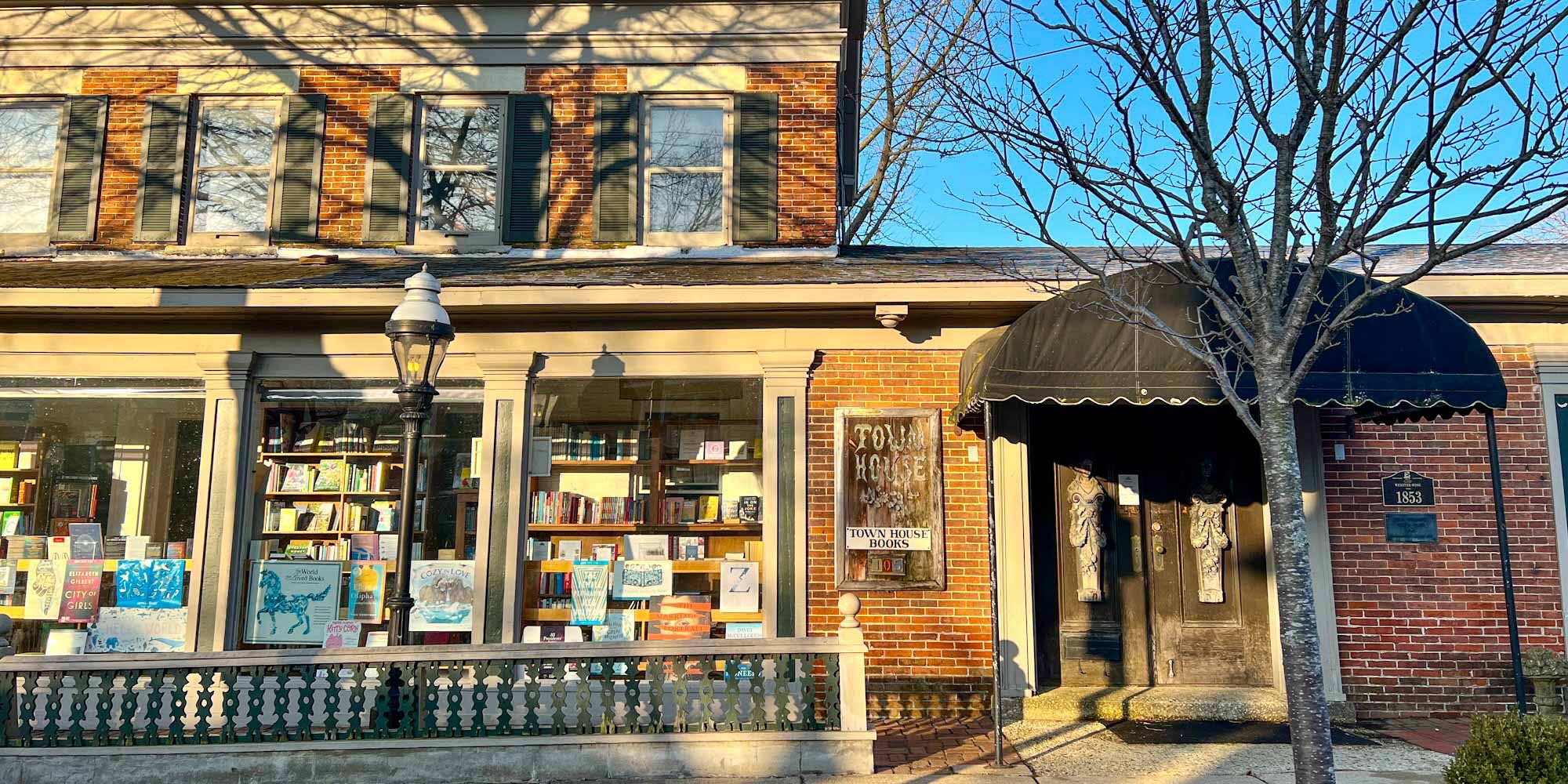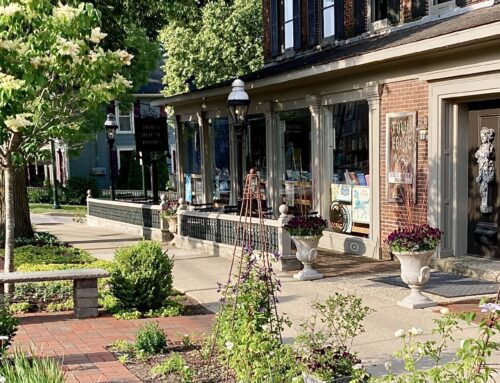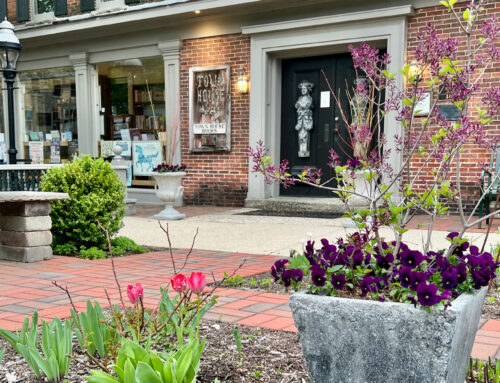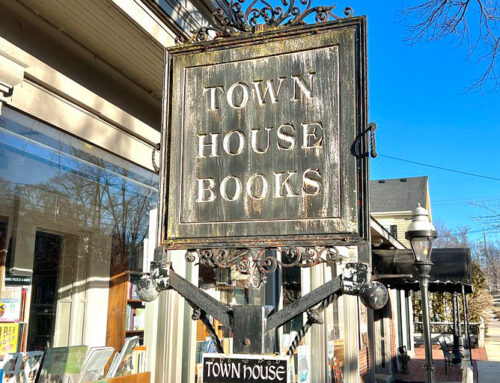All The Time In The World
The weight of time settled quietly, a slow, massive tilting of trees creaking in the wind, thousands of tonnes swaying gently above their heads. The snow, almost absent-mindedly, drifted down as if it had all the time in the world.
–from Held
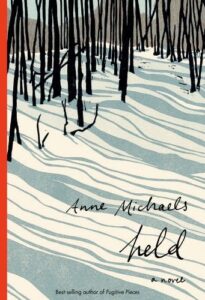 You don’t read Anne Michaels so much as let her happen to you. Her writing surges, permeates, expands, soothes. She understands the impact of words and the consolation of kinship. It is with slight trepidation that I attempt to share the work of this remarkable Canadian novelist and poet with you. Her work is impossible to reduce to any simple description, but the publication of her latest novel, Held, compels me to make the introduction to any who may have missed her along the way.
You don’t read Anne Michaels so much as let her happen to you. Her writing surges, permeates, expands, soothes. She understands the impact of words and the consolation of kinship. It is with slight trepidation that I attempt to share the work of this remarkable Canadian novelist and poet with you. Her work is impossible to reduce to any simple description, but the publication of her latest novel, Held, compels me to make the introduction to any who may have missed her along the way.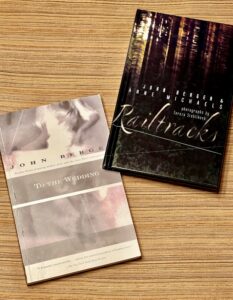
Anne Michaels’ writing can leave the reader equally unsettled and delighted. One of the few writers I would compare her to is English art critic, novelist, painter and poet, John Berger—especially his novel To The Wedding. Michaels and Berger were close friends for decades and shared a mutual admiration for each other’s work. They collaborated on a unique piece written for the stage called Vanishing Points that was published in the U.S. as Railtracks in 2013. Berger passed away in 2017 and Michaels’ collection of poetry All We Saw is dedicated to him.
Our lives glimpsed like back gardens, with a washing line—a persistent optimism—as the train draws out.
-From Railtracks
Michaels’ first novel, Fugitive Pieces (1996) became a bestseller and was made into an award winning film in 2007. It is the story of seven-year old Jakob, an orphan in 1940s Poland who is discovered and literally smuggled out of harm’s way under the overcoat of Greek geologist, Athos, and sequestered safely on the island of Zakynthos through the war years. With enthralling use of language, Michaels captivates us with the relationship that grows between a boy who has lost everything and a man who has seen everything.
 I’m a thief who has climbed through a window only to find himself struck frozen by a feeling of homecoming. The impossibility of it; the luck.
I’m a thief who has climbed through a window only to find himself struck frozen by a feeling of homecoming. The impossibility of it; the luck.
–from Fugitive Pieces
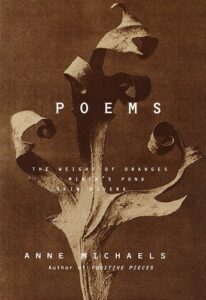 Language is the house with lamplight in its windows, visible across the fields.
Language is the house with lamplight in its windows, visible across the fields.
–from Poems
Michaels authored three books of poetry but didn’t write another novel until The Winter Vault (2009). A true masterpiece (and my personal favorite), Michaels again astounds with her poetic infusion into novel form.
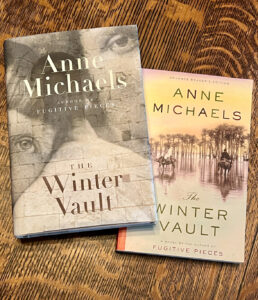 Set between northeastern Africa and Toronto, The Winter Vault is at its core the story of the fervent relationship between Avery, an engineer working on the relocation of the rock temples in Egypt in 1964, and Jean, a Canadian botanist who is recovering from profound losses in her life. Their story is folded within a larger, brilliant historical rumination on the essence of belonging and displacement. Michaels observes what happens when humans are forced to uproot and poses philosophical questions about the ways in which we wrestle with both private and communal loss and change.
Set between northeastern Africa and Toronto, The Winter Vault is at its core the story of the fervent relationship between Avery, an engineer working on the relocation of the rock temples in Egypt in 1964, and Jean, a Canadian botanist who is recovering from profound losses in her life. Their story is folded within a larger, brilliant historical rumination on the essence of belonging and displacement. Michaels observes what happens when humans are forced to uproot and poses philosophical questions about the ways in which we wrestle with both private and communal loss and change.
We become ourselves when things are given to us or when things are taken away.
–from Winter Vault
For example, this description of the Nubian homes in the village of Ashkeit, Sudan that could not be relocated but instead were submerged by the building of the Aswan Dam in Egypt, displacing thousands of Nubian residents:
 The houses were like gardens sprung up in the sand after a rainfall. As if cut by Matisse’s scissors, shapes of pure color—intense and separate… each a shout of joy.
The houses were like gardens sprung up in the sand after a rainfall. As if cut by Matisse’s scissors, shapes of pure color—intense and separate… each a shout of joy.
–from Winter Vault
Which brings us to the release of her most recent novel, Held (January 2024). Told in twelve sections that veer between dates covering 1910 to 2025, it is a work that really requires two readings. While the mind unravels the narrative during the first reading, the second reading allows us to settle into the rhythms and pleasure of her language.
 We are porous, fluid, fleeting, seeking; everything alive responding to the chemistry of light. So many kinds of time.
We are porous, fluid, fleeting, seeking; everything alive responding to the chemistry of light. So many kinds of time.
–from Held
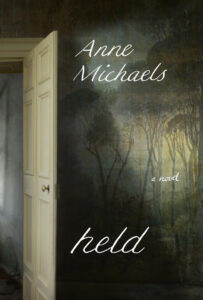 The narrative follows the lives of several linked characters through four generations that encompass war, contentedness, separation and kinship. In Section I (1917) we meet John and Helena when “blind chance” propels them into a life together even as John joins ranks with those who shared the prevailing conviction of the time that the First World War was the “war that will end war.” Ironically their daughter Anna eventually opts for a fate of risking her life in service wherever she is needed around the still war-torn world.
The narrative follows the lives of several linked characters through four generations that encompass war, contentedness, separation and kinship. In Section I (1917) we meet John and Helena when “blind chance” propels them into a life together even as John joins ranks with those who shared the prevailing conviction of the time that the First World War was the “war that will end war.” Ironically their daughter Anna eventually opts for a fate of risking her life in service wherever she is needed around the still war-torn world.
They squeezed into her single bed.
“Tell me everything,” he said. “Where were you happiest? What was your favorite food when you were a child? What was the first book that made you cry? I want to hear everything, don’t leave out a thing.”
“That will take forever,” she said.
“I hope so.”
–from Held
By Section IV (1984), third generation Mara, a doctor, meets photojournalist Alan, each humanitarians committed to war besieged countries. Fortuitously brought together, but ultimately torn by the choice between self-sacrifice or “stay where you’re needed most.” Between public service or Voltaire’s “tend your garden.”
Much as physical genetic traits are inherited, each generation of Michaels’ characters seem to inherit the capacity for a sustaining devotion through which she invites her readers to view the wider world.
Every one of Anne Michaels’ books is extraordinary, so whatever the entry point, I hope all of you thoughtful readers will take the opportunity to encounter her exquisite language and beautifully wrought stories.
Happy Reading!

